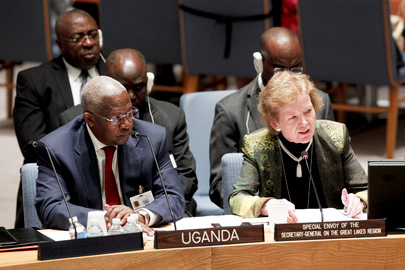Women's Messages for Action in the DRC and the Great Lakes Region
In the WILPF's recommendation which the CEDAW Committee picked up in their General Recommendation on the Democratic Republic of the Congo (DRC), WILPF highlighted the importance of strengthening women's participation in peace negotiations, regulating the arms trade, and effectively implementing the DRC 1325 National Action Plan (NAP). Many of these points were supported at the Tuesday, July 23rd panel on “Women's Messages for Action in the DRC and the Great Lakes Region” hosted by the Permanent Missions of Australia and Uruguay, Amnesty International and the Global Network of Women Peacebuilders (GNWP). The event featured Ms. Rose Kiese (Cadre Permanent de Concertation de la Femme Congolaise (CAFCO)) and Mr. Jack Christofides (DPKO) and was moderated jointly by Mr. Martin Vidal (Permanent Mission of Uruguay) and Mr. Michael Bliss (Permanent Mission of Australia). Scheduled just a few days before the Security Council's debate on the situation in the DRC and the Great Lakes, and following the July 9-11 regional conference in Bujumbura, Burundi on women, peace, security and dev elopment in the Great Lakes, the panel continued momentum to create peace and end violence against women (VAW) in the region.
elopment in the Great Lakes, the panel continued momentum to create peace and end violence against women (VAW) in the region.
Amnesty International's Head of UN Office Jose Luis Diaz introduced the panel by presenting thousands of postcards from Amnesty International members asking the Security Council to regulate arms in the DRC to ensure international human rights in accordance with the Arms Trade Treaty (ATT) and other human rights standards. Subsequent panelists addressed the challenges of the Intervention Brigade, which was created under the umbrella of the Peace and Security Cooperation Framework Agreement through the recently adopted Resolution 2098, which also extended the mandate of DRC peacekeeping operation MONUSCO until March 2014. Speakers stressed that addressing sexual and other forms of violence in the region is crucial and that women have to play an important role in this process. In addition, steps need to be made to decrease the proliferation of arms in the region.
GNWP's Mavic Cabrera Balleza concluded the panel by highlighting the April 2013 Women's Peace Dialogue and its Kinshasa Call to Action outcome document, which calls for immediate action to address the root causes of the conflict and to protect women and girls from the widespread sexual violence.
